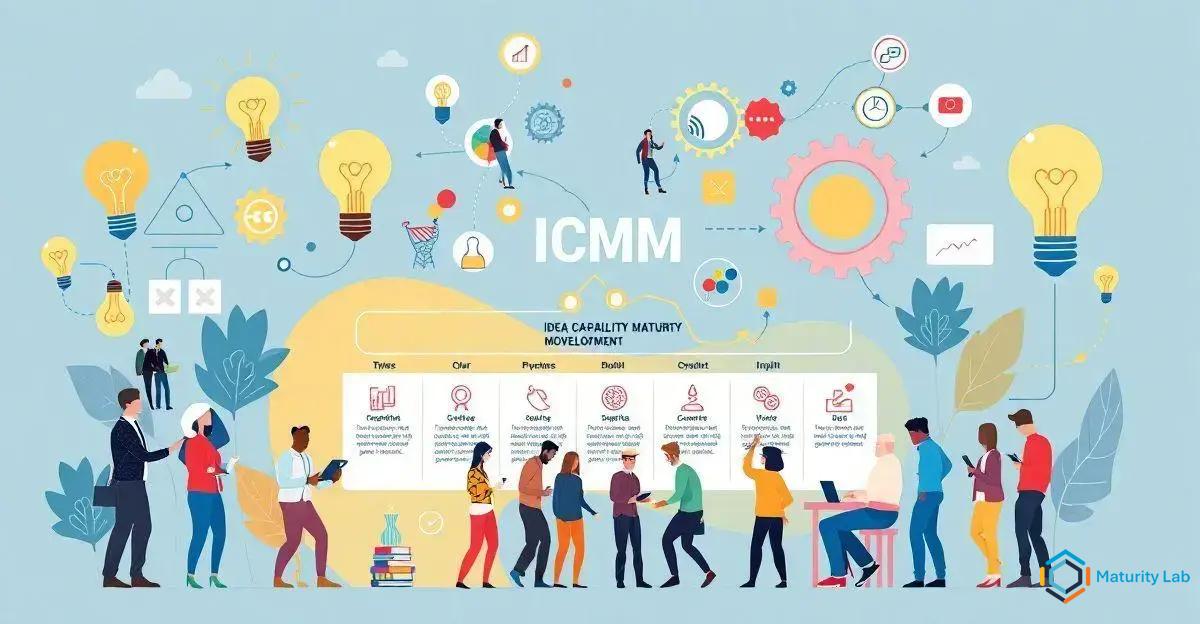Leveraging the Integrated Capability Maturity Model (ICMM) in idea management and product development enhances innovation and efficiency by providing a structured framework for assessing and improving maturity levels. This involves conducting maturity assessments, establishing governance, standardizing processes, integrating advanced tools, and focusing on continuous improvement to effectively capture, evaluate, and transform ideas into successful products, fostering a culture of innovation and driving long-term success.
In today’s competitive business landscape, leveraging the Integrated Capability Maturity Model (ICMM) in idea management can significantly enhance product development processes. By systematically assessing and improving your organization’s maturity in handling ideas, you can foster innovation and streamline the journey from concept to market. This article delves into the intricacies of ICMM, offering insights on its application in idea management and how it can be a game-changer for product development.
Understanding ICMM and Its Role in Idea Management

The Integrated Capability Maturity Model (ICMM) is a comprehensive framework designed to assess and enhance an organization’s maturity across various domains, including idea management. By understanding ICMM, businesses can systematically improve their processes, ensuring that ideas are effectively captured, evaluated, and implemented.
ICMM operates on a multi-level structure, typically ranging from initial, ad-hoc processes to optimized, continuously improving practices. Each level represents a stage of maturity, with specific criteria and best practices that organizations must meet to progress. This structured approach allows businesses to identify gaps in their current processes and develop targeted strategies for improvement.
Enhancing Idea Management
In the context of idea management, ICMM provides a clear roadmap for enhancing the entire lifecycle of ideas. At the initial stages, organizations may struggle with inconsistent idea generation and evaluation processes. As they advance through the maturity levels, they adopt more structured and repeatable processes, leading to better idea quality and alignment with strategic goals.
One of the key benefits of applying ICMM to idea management is the ability to foster a culture of continuous improvement. By regularly assessing their maturity level, organizations can identify areas for enhancement and implement changes that drive innovation. This proactive approach ensures that idea management processes remain agile and responsive to changing market conditions.
Furthermore, ICMM emphasizes the importance of stakeholder involvement and collaboration. Effective idea management requires input from various departments and levels within the organization. By promoting cross-functional collaboration, ICMM helps break down silos and encourages a more holistic approach to idea generation and evaluation.
To illustrate, consider a company at the initial maturity level where idea management is informal and lacks standardization. By adopting ICMM, the company can establish formal processes for idea submission, evaluation, and implementation. As they progress to higher maturity levels, these processes become more refined, incorporating best practices and advanced tools for idea management.
In summary, understanding ICMM and its role in idea management is crucial for organizations aiming to enhance their product development processes. By leveraging this maturity model, businesses can systematically improve their idea management practices, fostering innovation and driving long-term success.
Implementing ICMM for Effective Product Development

Implementing the Integrated Capability Maturity Model (ICMM) for effective product development involves a structured approach that aligns idea management with organizational goals. This process ensures that ideas are not only generated but also systematically evaluated and transformed into viable products.
The first step in implementing ICMM is conducting a maturity assessment to determine the current state of your organization’s idea management processes. This assessment helps identify strengths and weaknesses, providing a baseline for improvement. By understanding where your organization stands, you can develop a tailored action plan to enhance your idea management practices.
Once the assessment is complete, the next step is to establish a governance framework that supports idea management. This framework should include clear roles and responsibilities, decision-making processes, and metrics for evaluating success. Governance ensures that idea management is aligned with strategic objectives and that there is accountability at every stage of the process.
At the initial stages of implementation, focus on standardizing idea submission and evaluation processes. Create formal channels for idea submission, such as dedicated platforms or suggestion boxes, and establish criteria for evaluating ideas. This standardization helps ensure that all ideas are considered and evaluated consistently, reducing the risk of valuable ideas being overlooked.
As your organization progresses through the maturity levels, integrate advanced tools and techniques to enhance idea management.
For example, use data analytics to identify trends and patterns in idea submissions, enabling more informed decision-making. Additionally, consider implementing collaborative platforms that facilitate cross-functional teamwork and idea sharing.
Training and development are also critical components of successful ICMM implementation. Provide employees with the necessary skills and knowledge to participate effectively in idea management processes. This training should cover best practices for idea generation, evaluation, and implementation, as well as the use of any tools or platforms introduced.
Continuous improvement is a core principle of ICMM. Regularly review and refine your idea management processes based on feedback and performance metrics. This iterative approach ensures that your organization remains agile and responsive to new opportunities and challenges.
To illustrate, imagine a company that has implemented ICMM and reached a higher maturity level. They have a well-defined governance framework, standardized processes, and advanced tools for idea management. As a result, they consistently generate high-quality ideas that align with their strategic goals and drive successful product development.
In conclusion, implementing ICMM for effective product development requires a structured and systematic approach. By conducting a maturity assessment, establishing governance, standardizing processes, integrating advanced tools, and focusing on continuous improvement, organizations can enhance their idea management practices and drive innovation.
Incorporating the Integrated Capability Maturity Model (ICMM) into idea management and product development processes can significantly elevate an organization’s ability to innovate and succeed in a competitive market. By understanding ICMM and systematically implementing its principles, businesses can create a structured and efficient approach to managing ideas, from initial conception to final product launch.
The journey begins with a thorough maturity assessment to identify current capabilities and areas for improvement. Establishing a robust governance framework ensures that idea management aligns with strategic goals and maintains accountability throughout the process. Standardizing idea submission and evaluation processes at the initial stages lays a solid foundation, while the integration of advanced tools and techniques at higher maturity levels enhances decision-making and collaboration.
Training and Development
Training and development play a crucial role in equipping employees with the skills needed to contribute effectively to idea management. Continuous improvement, a core tenet of ICMM, ensures that processes remain agile and responsive to evolving market conditions and organizational needs.
Ultimately, the successful implementation of ICMM fosters a culture of innovation, enabling organizations to consistently generate high-quality ideas that drive effective product development. By leveraging ICMM, businesses can achieve a competitive edge, ensuring long-term growth and success in their respective industries.
Frequently Asked Questions about the Integrated Capability Maturity Model (ICMM)
What is the Integrated Capability Maturity Model (ICMM)?
The Integrated Capability Maturity Model (ICMM) is a comprehensive framework designed to assess and enhance an organization’s maturity across various domains, including idea management and product development.
How does ICMM benefit idea management?
ICMM provides a structured approach to improving idea management processes by identifying gaps, fostering continuous improvement, and promoting cross-functional collaboration, ensuring that ideas are effectively captured, evaluated, and implemented.
What are the steps to implement ICMM for product development?
Implementing ICMM involves conducting a maturity assessment, establishing a governance framework, standardizing idea submission and evaluation processes, integrating advanced tools, and focusing on continuous improvement.
Why is a maturity assessment important in ICMM implementation?
A maturity assessment helps identify the current state of an organization’s idea management processes, highlighting strengths and weaknesses, and providing a baseline for targeted improvements.
How does ICMM promote continuous improvement?
ICMM emphasizes regular review and refinement of idea management processes based on feedback and performance metrics, ensuring that the organization remains agile and responsive to new opportunities and challenges.
What role does training play in ICMM implementation?
Training equips employees with the necessary skills and knowledge to participate effectively in idea management processes, covering best practices for idea generation, evaluation, and implementation, as well as the use of any introduced tools or platforms.

